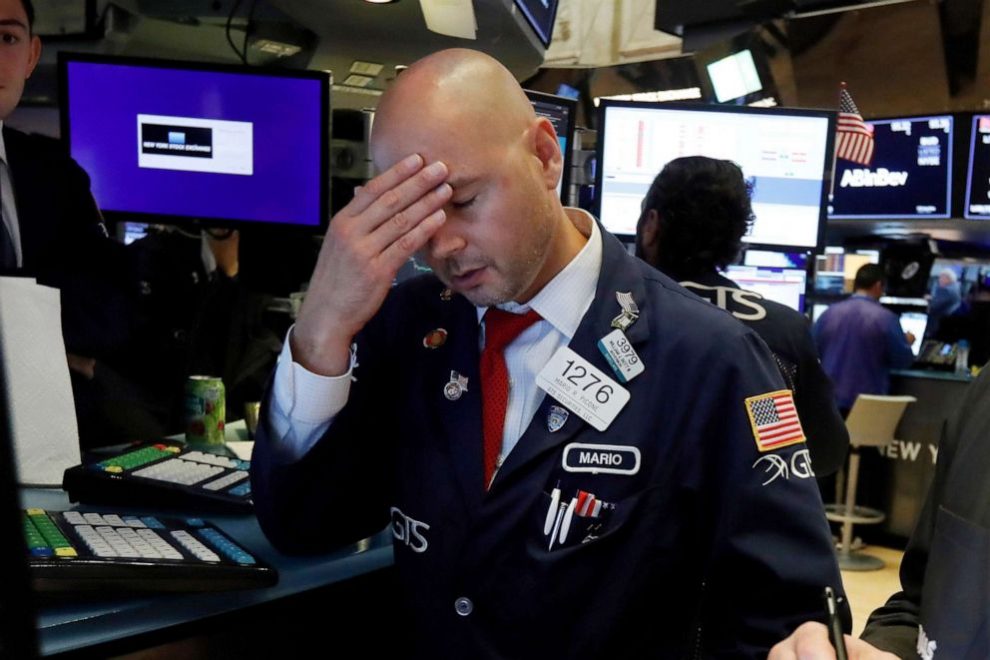Sharp declines in U.S. stock index futures triggered trading curbs meant to slow panicked markets as the price of oil fell by more than 30 percent and bond yields crashed amid heightened worries over the coronavirus.
E-mini futures on the S&P 500 dropped by 5 percent in overnight trading Sunday, triggering automatic trading curbs that kick-in when the price falls below 5 percent of the closing price of the referenced index Friday. As a result, the futures contract cannot trade at a lower price until the cash market opens at 9:30 a.m., although trades may still be made at higher prices.
The last time futures trading hit the overnight limit was election night of 2016, when markets initially sold off following the news that Donald Trump had won the election. That selling pressure quickly subsided and the major indexes closed up by around 1 percent or so the following day.
The E-mini is an electronically traded futures contract based on the underlying S&P 500 index. The contracts are around one-fifth the size of the standard S&P futures contracts, earning them the monicker “mini.” They are considered highly liquid and are widely traded but they have, in a few past episodes, been prone to so-called “flash crashes.”
How NASA May Have Just Pinpointed the Exact Day Jesus Died – April 3, 33 AD
Why repealing California’s EV mandate is dividing Senate Republicans
The red fitness watch challenge that’s keeping Capitol Hill active
‘Fork in the road’: Harmeet Dhillon calls on conservative lawyers to take on more civil rights cases
Grieving moms dig with ‘bare hands’ to unearth the dark truth behind their missing and murdered children
Detectives’ true crime podcast helps dig up breakthrough in case that haunted family: ‘drew audible gasp’
Florida man, 89, and his dog mauled to death by black bear in state’s first fatal attack
FBI Deputy Director Bongino: Illegal alien criminals and child predators are next in ongoing crackdown
Mike Rowe Compares Modern Dem Policy to Slavery: ‘No Different’
Democratic senator says there ‘needs to be space’ for Fetterman in party as Republicans come to his defense
Trump says ‘total reset negotiated’ with China during tariff talks in Geneva
Two injured after military vehicle crashes over highway retaining wall, plunges 30 feet onto road below
DHS says ‘arrests are still on the table’ after New Jersey House Dems caught on camera ‘storming’ ICE facility
ICE facility Democrats ‘stormed’ holds child rapists, murderers: officials
Inside the White House’s effort to pull India, Pakistan back from the brink of war
Futures for the Dow Jones Industrial Average and the Nasdaq Composite remain above the level that would trigger curbs in those contracts.
The chaotic market action was not confined to equities futures on Sunday. Investors bid up Treasuries, pushing yields down to new record lows, and oil prices tanked.
The yield on the 10-year Treasury note sank 37 basis points to touch 0.448 percent in overnight trading Sunday. The yield on 30-year Treasuries fell below 1 percent.
How NASA May Have Just Pinpointed the Exact Day Jesus Died – April 3, 33 AD
Why repealing California’s EV mandate is dividing Senate Republicans
The red fitness watch challenge that’s keeping Capitol Hill active
‘Fork in the road’: Harmeet Dhillon calls on conservative lawyers to take on more civil rights cases
Grieving moms dig with ‘bare hands’ to unearth the dark truth behind their missing and murdered children
Detectives’ true crime podcast helps dig up breakthrough in case that haunted family: ‘drew audible gasp’
Florida man, 89, and his dog mauled to death by black bear in state’s first fatal attack
FBI Deputy Director Bongino: Illegal alien criminals and child predators are next in ongoing crackdown
Mike Rowe Compares Modern Dem Policy to Slavery: ‘No Different’
Democratic senator says there ‘needs to be space’ for Fetterman in party as Republicans come to his defense
Trump says ‘total reset negotiated’ with China during tariff talks in Geneva
Two injured after military vehicle crashes over highway retaining wall, plunges 30 feet onto road below
DHS says ‘arrests are still on the table’ after New Jersey House Dems caught on camera ‘storming’ ICE facility
ICE facility Democrats ‘stormed’ holds child rapists, murderers: officials
Inside the White House’s effort to pull India, Pakistan back from the brink of war
Oil prices crashed more than 30 percent Sunday night after Saudia Arabia on Saturday slashed official crude prices for April following the collapse of talks between OPEC+, which includes the traditional OPEC nations plus Russia. Oil had fallen sharply on Friday following the news that talks had fallen apart but took an even deeper tumble, falling an additional 20 percent or so, when it became apparent that the once allied oil producers were now engaged in a price war to take market share from each other.
Low oil prices were an unambiguous boon to the U.S. economy, boosting consumer buying power and keeping a lid on inflation. But now that the U.S. is once again a major world oil producer, low oil prices can weigh on employment, manufacturing, and the financial stability of heavily-leveraged U.S. drillers. That could even shake some regional banks with large exposures to the drillers.
Story cited here.
























